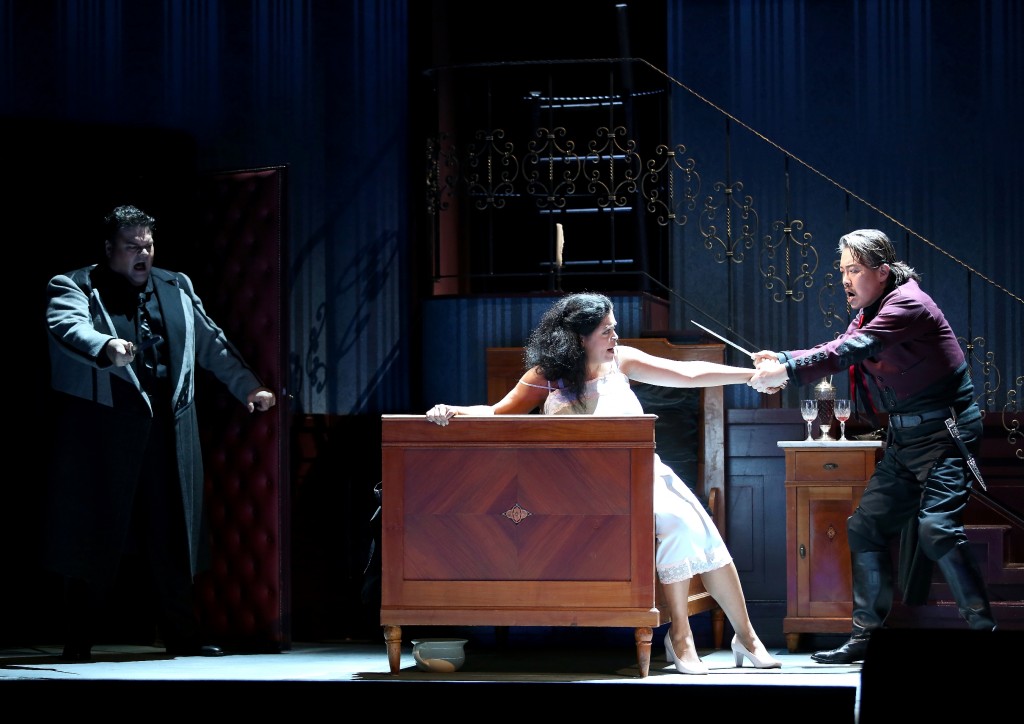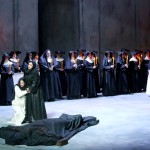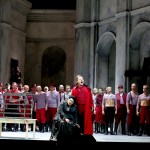 Verdi’s Il Trovatore is one of a trio of operas -after Rigoletto, before La Traviata -that (beginning 1850s) launched Verdi’s worldwide fame. But Trovatore has fallen out of favour, reviled for a supposedly weak and implausible libretto, its scandalous ‘Church baiting’. Verdi’s contemporary critic Edward Hanslick scorned the sensationalised horror in which a gypsy brings up the son she rescues from a fire. In Verdi’s plot Manrico thinks he’s the son of gypsy Azecuna, who’s obsessed with avenging her own murdered child. The key theme is the deadly rivalry between unknowingly estranged blood brothers. The outsider (troubadour) Manrico and Count Luna (military commander) are on opposed sides politically, but also in love with the same woman, Leonora. Verdi’s love story is also a ‘parable of the repression of minorities.’
Verdi’s Il Trovatore is one of a trio of operas -after Rigoletto, before La Traviata -that (beginning 1850s) launched Verdi’s worldwide fame. But Trovatore has fallen out of favour, reviled for a supposedly weak and implausible libretto, its scandalous ‘Church baiting’. Verdi’s contemporary critic Edward Hanslick scorned the sensationalised horror in which a gypsy brings up the son she rescues from a fire. In Verdi’s plot Manrico thinks he’s the son of gypsy Azecuna, who’s obsessed with avenging her own murdered child. The key theme is the deadly rivalry between unknowingly estranged blood brothers. The outsider (troubadour) Manrico and Count Luna (military commander) are on opposed sides politically, but also in love with the same woman, Leonora. Verdi’s love story is also a ‘parable of the repression of minorities.’
Vienna Volksoper’s Il Trovatore , a co-production with Bonn Opera directed by Dietrich Hilsdorf, has polarised opinion. So I’d expected a radically modern take. Not so. It was criticised as a tasteless spectacle, but well crafted. Arguably, the shock scenarios, derive from the material. The bloodthirsty scenes are justified in depicting the ‘Inquisition’.
In the event it is thrilling theatre, restoring the stage to Verdi’s mid-19th century context : gothic blood and gore, a mystery thriller of its time.
So I can’t understand why Vienna Volksoper wasn’t packed. No really big names, but the sets are splendid, the measure of the more famous Staatsoper, which invariably has full houses, and Volksoper Orchestra and chorus, under veteran Alfred Eschwé, are of the best.
The opening scene is pure spectacle, soldiers in colour co-ordinated burgundy and lilac; background authentically grey plastered walls. But it’s shocking- Ferrando, their CO stirs up the soldiers’ fear of witches and hatred of gypsies: setting the scene, underlying suspicions and racism. He sings of how a gypsy abducted and burned the Duke’s son; the witch- albeit life-size puppet- is baited and viciously bayoneted.
But the Chorus is splendid, Verdi a composer ‘at the height of this melodic vitality’. Indeed the Chorus- as in Rigoletto– have some of the most memorable tunes, (Trovatore’s characters perhaps less memorable.)
Verdi’s opera is unusually divided into ‘Scenes’. Purists might complain of ‘Director’s cuts’: the opera expurgated. But the episodes with introductory titles give a modern ‘cinematic’ quality.
So scene 2 (The Duel) Leonora is the focus, waiting for her troubadour. She’s warned by her friend of the consequences of the social mismatch. (Again a stylish set: four-poster bed centre, rear a wrought-iron stair well, refined regency silk-papered walls.) Leonora (Irina Oknina) is elegantly sung in her aria about the dream : not the most powerful of sopranos, but bewitching. And surprisingly, moving to the front of stage, she scales the heights: love is too great to put into words, her fate is defined in proximity to him. She casts off white satin layers: then in a ravishing aria -now with a wine glass in her hand- wearing only a white slip.
Manrico at Leonora’s window, observes her- in the arms of Count Luna. Mathew Hausmann, tall, black-hatted, croons every fibre in him burns of love: he must see her. He trembles, a heart gives hope. A voice off-stage, Manrico. Faithless! – She’s thrust between the two rivals. Manrico is Vincent Schirrmacher, effectively groomed as Italian. The two protagonists brandish their glimmering swords- the bed in between- Leonora at first separating them.
The Gypsy scene: Vedi! Le fosche notturne spoglie, the gypsies’ Anvil Chorus. A stage of black-clad figures, with a make-do statue of the Madonna on an oil barrel; left- stage a barred window. Azucena the formidable mezzo Chariklia Mavropoulou, sings of a woman burnt at the stake: the flames blaze to the heavens! As the female Chorus reiterate the men’s refrain- she emerges. Manrico, badly wounded, is on crutches, nursed to health by Azecuna. She sings of how she exchanged her own son- sacrificed to the fire -to rescue him. How her mother cried for revenge, her words engraved in her soul: how her own son cried so badly it was heart-rending. Mavropoulou, a fulsome lady, magnificently enacts her role. She sings, appeals to the heavens – kneeling- still consumed with grief. (God is this operatic!) -Manrico, then is he not her son? – She convinces him: has she not always given him a mother’s love. She was confused- reacting to her story- so overcome by emotion. The ‘accursed moonshine’ shone on him.
Manrico sings of how he wanted to administer the fatal blow to the Count; an unforeseen power stopped him. Now she offers him her dagger. He swears -without mercy- to avenge her and kill Luna.
 In a grey-walled cloister, Count Luna hearing Leonora -presuming Manrico dead- intends to enter a nunnery, laments in his aria: everything is lost, but he ‘won’t let her become another Jesus’. She’s his! He sings of her beauty, her radiant smile. The Count is on his knees pleading- Housman finely articulated, but not the thrilling high notes. But what staging! He uncovers a marble life-size statue of Christ; unbolted, hides in its place. Red uniformed soldiers swarm in to abduct Leonora. Off-stage nuns are heard; they approach with candles. The Count jumps out from beneath a black cloak; and there’s Manrico holding his sword unsheathed. (Meanwhile nuns cluster behind the Christ statue for protection.) The Count clutches at Leonora. Soldiers raise their rifles as Leonora escapes with Manrico.
In a grey-walled cloister, Count Luna hearing Leonora -presuming Manrico dead- intends to enter a nunnery, laments in his aria: everything is lost, but he ‘won’t let her become another Jesus’. She’s his! He sings of her beauty, her radiant smile. The Count is on his knees pleading- Housman finely articulated, but not the thrilling high notes. But what staging! He uncovers a marble life-size statue of Christ; unbolted, hides in its place. Red uniformed soldiers swarm in to abduct Leonora. Off-stage nuns are heard; they approach with candles. The Count jumps out from beneath a black cloak; and there’s Manrico holding his sword unsheathed. (Meanwhile nuns cluster behind the Christ statue for protection.) The Count clutches at Leonora. Soldiers raise their rifles as Leonora escapes with Manrico.
The witch hunters scene, in which Azecuna is interrogated, is shocking , but not gratuitous. (It anticipates Verdi’s Don Carlo where Flemish Protestants are incinerated.) Two black- hooded figures bearing placards are beaten in procession by soldiers- ironically accompanied by Verdi’s jolly Squilli echeggi la tromba guerriera. But front of stage, there’s a cage with a stooped figure being poked by inquisitors, a Priest attending. Azecuna is interrogated, put to the test. Gypsies have no roots, she responds defiantly. She’s handcuffed, plied by Luna with wine. She’s revealed as the child abductress- daughter of the witch they had burned. Azecuna cries out for Manrico. The soldiers, linked in a line, begin a ‘witches dance’. Azecuna is led to a fire. Macropoulu is heart-rending, chillingly powerful, but no way exaggerated.
Meanwhile (The Gypsy’s Son) Manrico and Leonora together at last, prepare to wed. He’ll think of her to his last breath (Ah si, ben mio. ) Schirrmacher sings eloquently, with beautiful diction. (Heavenly Chorus; Madonna foreground; we glimpse green lawns, people in flight, indicating war.)
In the Revenge of the Rivals, Manrico is led away blind-folded. Leonora positioned (centre stage) front of the bed, is seated blindfolded in a black coat, before her interrogator. In her aria, she reminds Luna of their previous love. Beautifully enunciated, Oknina’s Leonora, a lighter soprano, but no hint of strain. Her coloratura was beguiling. She’s shunted across the stage, observed silently by the Count. His only God is revenge, he sings. She begs mercy for Manrico. Her appeal enrages him. She swears to offer herself to him (while she takes poison unnoticed.) For him it’s a dream come true.
For The Execution, the set is a grey-plastered building. Manrico is sitting on a long bench with Azecuna now blind. Mavropoulou, hair -cropped, wearing large dark glasses, sings movingly she’s tormented by visions: the picture of the burning woman, her mother. Weariness bears down on her (Si la stanchezza m’opprime.) They find solace in Manrico’s troubadour song, D’amor sull’alli rosee.
Leonora has come to recue Manrico: but at what price? She has sold their love- he reproaches her- to his rival. She begs him to escape, or all is lost. Oknina is on her knees, the poison working too quickly. She collapses between the two rivals, confessing to Manrico, she chose death rather than life with another man. Manrico is carried away .
The closure is vintage Verdi. In his death throes, Manrico calls for his mother. Azecuna sings triumphantly to Luna, ‘He was your brother!’…’Mother, you are avenged!’ Her vow fulfilled, yet, dying, she calls for Manrico, her son.
This Volksoper co-production is a triumph of stagecraft and not to be missed. The cast was adequate, Mavropoulou unforgettable. This revival justifies Verdi’s Il Trovatore, ‘a phenomenon in Italian opera.’ P.R. 3.09.2014
Photos: Stuart Neill (Manrico), Melba Ramos (Leonora) and Tito You (Luna) ;Melba Ramos (Leonora); Janina Baechle (Azecuna) .Photos of the September 2014 cast were not available
(c) Barbara Pálffy / Volksoper Wien
viennaoperareview.com
Vienna's English opera blog
